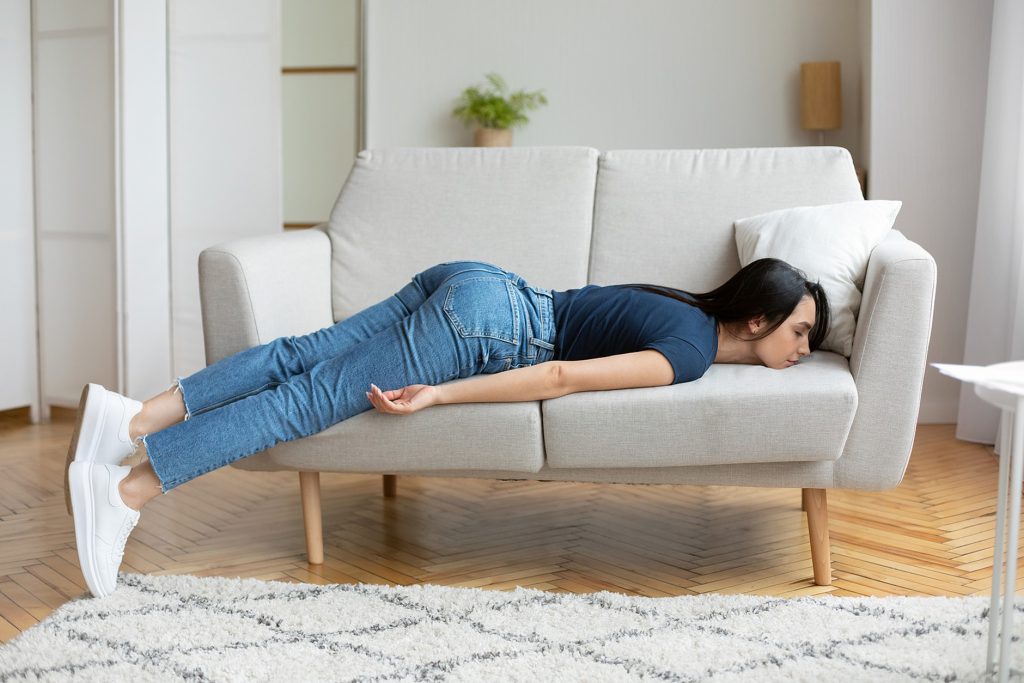
It’s the middle of the day and you just can’t seem to get out of first gear. Is it a lack of sleep, or could there be something else that makes you feel so lethargic?
Much of the current ‘tiredness epidemic’ is blamed on our increasingly co-dependent relationship with technology and widespread use of laptops and smartphones around the clock. The reasons for being perpetually exhausted can be broadly broken down into lifestyle factors, physical causes, and psychological causes. Check out a few of these culprits for fatigue and possible reasons why you may feel tired all the time. (WebMD, 2019)
Lifestyle
It is unlikely that one aspect of your lifestyle that is making you tired; although, there are various interlinked factors that work together to make you sleepy or tired. Drinking coffee and tea during the day and alcohol during the evening can disrupt your night’s sleep and stop you from getting good quality rest. If you suspect that this is the cause of your fatigue, try to limit the consumption of caffeine and alcohol.
What you eat is intricately linked to body energy levels. Eating sugary foods gives you a short-term boost however makes the body lazy and crashes later in the day, making processed sugar something to avoid in large quantities. Ideally, we should consume slow-release energy sources such as fruit, vegetables, and wholegrain carbohydrates.
Crash dieting or not eating enough can make you tired. Denying yourself food is denying the body the fuel it needs to operate optimally. Stick to healthy small meals during the day and overeating is less likely. Make sure you have a healthy to-go snack or protein bar handy on busy days where leaving the office without prepping a healthy lunch or fast food tempts you.
When you feel exhausted, it can be harder to motivate yourself to be active and exercise. Sometimes, a more sedentary lifestyle tricks the body into producing more melatonin, the sleep hormone. Even taking a ten-minute walk outside in the natural light and fresh air can help to reverse this cycle. (Healthline, 2020)
Being still during the day can disrupt your body’s natural circadian rhythm or sleep-wake cycle, and so can looking at screens late at night. The artificial light from your laptop or smartphone suppresses melatonin production which makes it harder to fall asleep. It’s recommended trying to limit your use of technology for at least an hour before you plan to go to sleep.
Physical
There are many possible medical reasons for tiredness, and most of these will elicit other symptoms alongside fatigue. If the excessive tiredness coincides with any other unexplained issues such as weight loss, extreme thirst, hair loss, heavy periods, or a change in bowel habits, it may be that this tiredness has an underlying physical cause. (Medicine Net, 2020)
In such conditions, the doctor can perform some blood tests to check for common conditions such as anemia, diabetes, food intolerance, or obstructive sleep apnoea. Sleep apnoea if left untreated can be deadly and a sleep study done by a neurologist would be ordered by your doctor. Chronic fatigue syndrome (also called ME) is a severe illness that can make anyone feel physically exhausted for at least six months. The tiredness is often accompanied by symptoms such as muscle or joint pain and headaches. So you can see, diagnosis for many is a process of discovery.
If you are underweight or overweight then your body needs to work harder than normal to do everyday tasks, which means getting tired more easily. Again, diet plays a big part of how we feel and achieving a healthy weight could alleviate symptoms. Having a dietary consultation is an ideal first step to taking control of fatigue caused by an improper diet or disease like diabetes.
Psychological
Psychological causes are the most common reason for feeling fatigued. Pressure from work and financial worries are the main factors in anxiety that keeps people up at night. Anxiety-induced insomnia is a widespread issue, and one study found that almost one in three people are severely sleep-deprived. (Medicine News, 2020)
As well as stopping you from sleeping, mental health problems can manifest in a feeling of listlessness and fatigue. Depression and anxiety are the worst and can make you feel physically unable to take part in everyday activities.
Takeaway
Some days are more tiring than others. It’s important to recognize ordinary sleepiness from excessive tiredness. Being tired is disruptive in anyone’s life. Ideally, excessive sleepiness can be fixed with lifestyle changes, but it can require a closer look at your health. If you still feel worn out after trying to manage your fatigue on your own, schedule a visit with your primary care physician.
We understand being tired as our nurses and physicians work long shifts, battling fatigue from time to time, so we understand. Working long hours seems to be a part of our contemporary culture; however, being too tired interferes with our happiness and overall well-being.
We’re always here for your health emergencies, 24/7. Our ER doesn’t sleep so we can be here for you when you need us.
Work Cited
Khatri, Minesh. “Extreme Fatigue and Exhaustion: 10 Possible Causes.” WebMD, WebMD, 13 Nov. 2019, www.webmd.com/balance/how-tired-is-too-tired
“Why Am I So Tired? Causes of Fatigue.” MedicineNet, Mar. 2020, www.medicinenet.com/why_am_i_so_tired_the_many_causes_of_fatigue/views.htm
Spritzler, Franziska. “10 Reasons You’re Always Tired (And What You Can Do About It).” Healthline, Healthline Media, 3 Apr. 2020, www.healthline.com/nutrition/10-reasons-you-are-tired
“5 Reasons You Feel so Tired.” Medical News Today, MediLexicon International, 2020, www.medicalnewstoday.com/articles/320800
